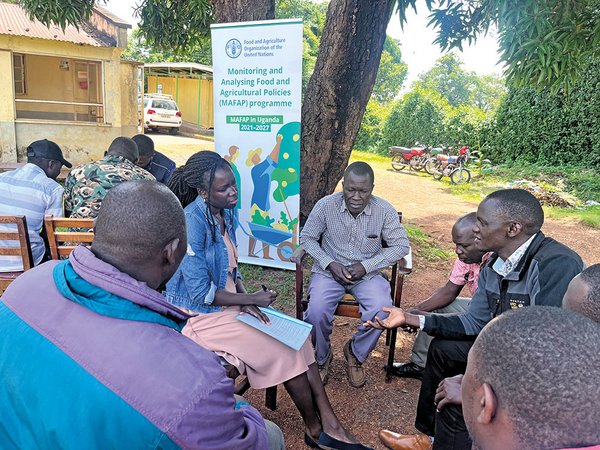 Download this article in magazine layout
Download this article in magazine layout
- Share this article
- Subscribe to our newsletter
Supporting governments in optimising agricultural spending and policies – FAO’s MAFAP programme
By filling a gap in policy support to monitor and analyse policy incentives and public spending in greater depth, MAFAP’s economists and policy analysts have been able to shine a light on how coherent countries are with their support to food and agriculture vis-à-vis their agricultural transformation objectives. At the core of MAFAP’s first phase, from 2010 to 2014, was price incentives analysis, which since then has been helping countries to monitor the effects of domestic policies on the prices farmers and traders fetch for their commodities. The programme has also contributed price incentive indicators for Africa in the form of a harmonised global database of support to agriculture through the Ag-Incentives Consortium, composed of FAO, the International Food Policy Research Institute (IFPRI), the Inter-American Development Bank (IDB), the Organisation for Economic Co-operation and Development (OECD) and the World Bank.
Monitoring and tracking public expenditures also gained traction throughout the programme’s second phase (2015 to 2021). This policy support has allowed governments to identify areas in agriculture and rural development that are underinvested or those which would have higher returns on investment, as well as to reveal budget bottlenecks that are clogging up the public purse’s resources to the sector. The analysis led to a greater emphasis on proposing solutions in the shape of evidence-based policy reforms to address specific problems in the agri-food sector, tackling issues such as commodity pricing to trade and marketing issues through to regulatory affairs and public investment strategies.
Since its start, the MAFAP programme has helped bring about over 30 reforms to agri-food policies in sub-Saharan Africa. Now in its third phase until 2027, funded by the Bill & Melinda Gates Foundation and under institutionalisation in FAO, the programme boosts a dedicated data hub on policy monitoring, has recently expanded its scope to several countries in North Africa and South Asia, and is also adapting innovatively to testing times.
Prioritising budgets
Long considered as a benchmark for agricultural spending, the Maputo Declaration – signed 20 years ago by African Union countries – saw governments commit to allocate ten per cent of all public expenditure to the agriculture sector to spur socio-economic growth. Yet, MAFAP’s monitoring has shown that over the years, many countries in Africa struggle to spend this much, and not all their spending is effective. Given this dilemma, the programme wanted to support countries to spend what they can afford – but much better.
To do this, the MAFAP team developed a multisectoral, economy-wide policy optimisation modelling tool to help governments prioritise their spending in the areas where this can be most cost-effective. This tool runs a set of scenarios to advise governments on how to better allocate agriculture budgets across different public investments to get as close as possible to their inclusive agricultural transformation objectives. In doing so, the analysis considers all productive and financial constraints of the country's economy to provide policy-makers with the most realistic advice possible.
The results coming from the new policy optimisation tool have already been presented this year to three countries in sub-Saharan Africa, Ethiopia, Uganda and Burkina Faso, providing their Ministries of Finance, Agriculture and Planning Commissions with insights and scenarios that can inform policy-making and future budget allocations to the sector with the best payoffs for society at large. The evidence emerging is showing governments that, if they use the same public money but reallocate it differently, they can boost agri-food output, lift thousands of people out of poverty, create thousands of off-farm jobs in rural areas, and even allow millions more people to afford a healthy diet. Given this potential, the results are proving particularly relevant to inform national development strategies and plans across Africa.
Looking forward with a climate lens
MAFAP’s future will inevitably focus more on climate change, especially because this phenomenon is having an impact on how effective current agri-food policies and budgets are. The programme will expand its work to understand if agricultural public expenditures are supporting national adaptation plans and climate commitments, the vulnerability of public expenditure to climate change and the potential of specific public projects and activities in agriculture to help build climate resilience.
The policy optimisation tool will be enhanced to account for climate-change effects when optimising the allocation of public resources towards agriculture across several investment areas (e.g. fertilisers, seeds, irrigation, extension, R&D, etc.). This collaboration is to support countries in reallocating and repurposing their public resources to help de-risk climate-smart agricultural technologies and practices that could be scaled up by the private sector.
Marco V. Sánchez is the Deputy Director of the Agrifood Economics Division of the Food and Agriculture Organization of the United Nations (FAO) in Rome, Italy.
Contact: marco.sanchezcantillo@fao.org
© FAO, 2023.The views expressed in this publication are those of the author and do not necessarily reflect the views or policies of the Food and Agriculture Organization of the United Nations.
More information on MAFAP website:
https://www.fao.org/in-action/mafap/home/en/





Add a comment
Be the First to Comment